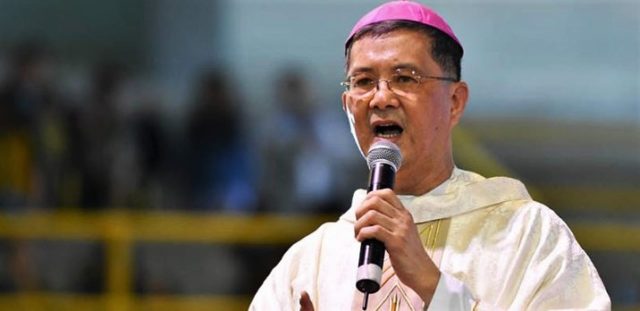BALANGA CITY — Bishop Ruperto Santos on Saturday said that the Catholic Church considers the Eucharist as the “source and summit” of the whole Christian life and where it shares the joys and sufferings of the world and so has to be continued despite the modified enhanced community quarantine but with some restrictions.
“With the enhanced community quarantine and now the MECQ, our religious celebrations are status quo and we are morally obliged to collaborate and observe all precautionary measures that the government implemented for the advancement of spirituality and sanctity of life,” the prelate said.
The bishop issued some directives to be followed until such time that MECQ will be lifted while also following the directives of the national and provincial government. He said that any outside religious activities should be done with proper consent and permission of the local government units.
On the celebration of the Eucharist, here are the directives of Santos, also chair of the Bishops’ Conference of the Philippines’ Pontificio Collegio Filippino:
1. Eucharistic celebrations especially on Sundays are live streaming with proper observations of physical social distancing, limited participations, wearing face masks, and taking in consideration personal hygiene.
2. The Holy Eucharist will be celebrated at the sanctuary of the main church and not at a makeshift altar. No Eucharist will be celebrated in the chapels. There should never be Holy Eucharist in any private homes, likewise no live streaming Eucharist in any home. The celebrant must also observe the proper vestments.
3. Those with ages below 21 years old and 60 years old up are not allowed to attend the Eucharist. They are advised to stay at home and join in the online Eucharist.
4. Eucharistic celebrations in the presence of a large congregation in Balanga diocese are still suspended. However, with the creativity of the parish priest, the live streaming of the Holy Eucharist must be done for parishioners who are sick and old, as precautionary measures.
5. Holy Eucharist on Saturdays (Anticipated Sunday Mass) at 5:00 in the afternoon will be allowed to cope with the lesser number of Eucharistic celebrations on Sundays. All Eucharistic celebrations in the afternoon must always be at 5:00 or earlier to comply with curfew hours so that people can be home on time.
6. To observe social distancing and limited participations, barangays are allowed to participate in the celebration of the Eucharist in an allotted hour given to them with reserved seats. It can be done through online texting in the parish office or social media page.
If they do not have reserved seats, they are not allowed to enter the church.
7. Encourage the faithful to come on weekday celebrations of the Eucharist if they cannot come on Sundays.
8. There should be an entry and exit scheme to avoid unnecessary physical contact and to keep order. Entrance must be one way at the main doors, as guided by the greeters/usherettes; exit doors must be one way, that is, the side doors or other doors as guided to serve the purpose to avoid mingling of people.
9. There should be alcohol or hand sanitizer, and foot baths at the entrances. The parish priests are encouraged to form and organize ministry of sanitations, or expand the functions of greeters/usherettes to do the services for such purposes.
10. There should be notices in front of religious images telling the people not to touch or wipe the images. Short prayers can be posted in front of the images to help the people pray in front of them.
11. All holy water fonts should be emptied and covered so that they may not be used. Tell the people not to leave their garbage especially their used tissue in the church and bring it with them when they leave and dispose it in the proper places.
12. For those parishes that have comfort rooms, make sure that water and soap are provided for proper hand washing, with alcohol and proper distancing.
13. In the actual celebrations of the Holy Eucharist, the faithful who will be present must wear face mask and bring his or her own alcohol or hand sanitizer.
14. Altar servers, lectors, cantors, and extraordinary ministers of Holy Communion are limited to two and may serve given that they observe the social distancing norm. If the altar servers are all children, let the extraordinary ministers of Holy Communion be trained to serve in place of them.
15. Instead of the choirs or music ministry, we will just request a song leader and an instrumentalist to lead the people in singing. The lectors should wear facemask when reading. Offertory is omitted. There will be a designated basket and place wherein they can place their offering.
16. The collection during the offertory will be done through bags “buslo” attached to poles, and not bags or baskets that are passed around. Offerings (in kinds and cash envelopes) can be done alsowith some stations- corners monitored by the usherettes.
17. In view of the diocesan plan of the cancellation of the Arancel system — that is, paying certain amounts for the services such as mass intentions, funerals, stole fees, certificates, and so on, this could be the proper stand point for an alternative support for the Church through donations and love offerings.
18. There will be no holding of hands during the Our Father. One may clasp his or her hands as a sign of prayer. There will be no expressions of endearment (pagmamano, kiss and shaking of the hands) during the sign of peace. One may just bow with a smiling face to show the sign of peace and respect to the one being greeted.
19. There will be no queue of people during communion. The priest or the extraordinary minister of Holy Communion will approach the faithful one-by-one in their respective seats.
20. If the congregation is small enough especially in a weekday Eucharist, only the priest can give communion. The priest and the lay ministers will wash their hands with alcohol before and after they give communion.
21. After the Post-Communion Prayer or at the beginning of the Mass, the Oratio Imperata for Covid-19 must be recited.
22. The people must receive catechisms and proper explanations for the changes due to adjustments of the Eucharistic celebrations and much needed guidelines called for by the aftermath of Covid-19 pandemic.
23. In post-celebration of the Holy Eucharist, priests must go directly to the sacristy after Mass and must not mingle with people. The people must take the exit doors as soon as possible as prescribed by the one-way direction to avoid physical encounters and socialization.
24. There should be at least half an hour interval between Eucharistic celebrations to disinfect the Church after each service.
Santos said that with this Covid-19 pandemic, it is also “God’s call for us to be His face, heart and hand of mercy and compassion to our people and we must live out our faith and open the doors of our hearts to welcome the Lord in our lives.”
He called on every one to pray and unite with God and one another: “We in faith will experience again the wake of a new dawn of an alive and renewed Church in the world. Through the loving protection of our Blessed Mother, the Virgen Milagrosa del Rosario de Orani, and the fatherly care of St. Joseph, our beloved patron saint of the diocese, may we be able to surpass this pandemic.”





